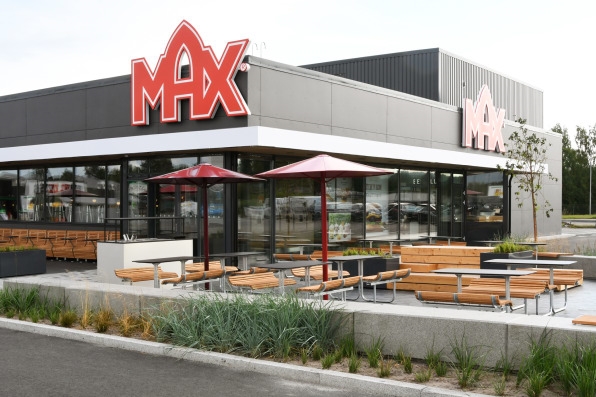It’s widely known that our love of red meat is wrecking the planet. Animal agriculture accounts for around 15% of global greenhouse gas emissions.
Slowly, the food and restaurant industries are starting to acknowledge the need to move away from red meat. Demand for vegan and vegetarian food increased 600% last year, and restaurants and suppliers took note. The plant-based Impossible Burger is cropping up on menus from gourmet restaurants like Manhattan’s Momofuku Nishi to White Castle. The burger chain Sonic debuted a blended option that’s half mushroom, half meat.
While responding to (and attempting to influence) consumer behavior will play a large role in driving down global dependence on red meat, the Swedish chain Max Burger is taking it a step further: Through a new, ambitious carbon offsetting program, the company thinks it can make the sale of its burgers actually improve the planet.

Claiming theirs will be the world’s first “climate positive” burgers, the company will plant enough trees to offset 110% of the carbon emissions associated with its business. The initiative will begin June 14, in honor of the company’s 50th anniversary.
“It’s not enough to just reduce emissions anymore or to be climate neutral,” Richard Bergfors, Max Burger president, tells Fast Company. “We have to do more.”
Back in 2008, though, climate neutral was the company’s goal. “Back then, we really realized that climate was a big challenge, and that we were a big part of the problem because we were selling red meat,” Bergfors says. “So we decided: Let’s be honest about this.” With the help of a team of auditors and researchers, Max Burger labeled the climate impact of every item on its menu, and conducted a thorough survey of its business operations and supply chain to determine its total carbon footprint.
While the company began to implement climate-friendly solutions, like adding more plant-based products to the menus and converting to 100% wind energy, it also began to compensate for the livestock-based emissions it couldn’t reduce through carbon offsetting–in Max Burger’s case, planting enough trees in Mozambique and Malawi to counteract the emissions associated with its business. To date, they’ve spent millions of dollars each year and planted 1.5 million trees. “We put a tax on ourselves,” Bergfors says. It’s expensive for the company to maintain this program, he adds, but the idea was for the emissions reductions efforts to eventually scale up to where the offsets weren’t needed (Max Burger is also Sweden’s most profitable restaurant chain).
Its new initiative will expand upon the company’s existing carbon-offsetting model, but will surpass neutrality to deliver a net positive–more emissions removed via planted trees then expended by the cows. The company is now accounting for not only its own carbon emissions, but that of its guests by taking into account travel to and from the restaurant, and other incidentals. To do so, Max Burger added an extra 10% to the emissions total it needs to offset, and will plant enough trees to meet that measurement.
Reaching for a carbon-positive standard is not unique to Max Burger, and arguably, companies like The North Face have taken an even stronger approach by sourcing wool from sheep raised on a farm that actually sequesters carbon in the ground as the sheep graze. Through innovative soil-use tactics, the farm stores more carbon than it releases, and it’s a strategy that can and should scale more broadly to other farms–especially those that major chain restaurants source from.
Perhaps Max Burger will be able to help promote that tactic, too: Timed to the announcement of the new “climate positive” initiative, Max Burger launched a website, Clipop.org, that will allow companies to register their products that deliver environmental benefits, and describe how they accomplished climate positivity, in the hopes that more companies will follow suit.
And alongside its ramped-up offsetting initiative, Max Burger has expanded its range of plant-based options, and the sale of meat-free meals has increased 900% (from 2% to 18% of sales) in the past two years. That’s driven the company’s overall emissions down by 13%, and the hope, according to Bergfors, is to get to the point by 2022 where every other meal sold at one of the chain’s 130 restaurants will be made with something other than beef. If they’re successful in doing so, Max Burger’s emissions should drop by 30% in the next few years.
(38)